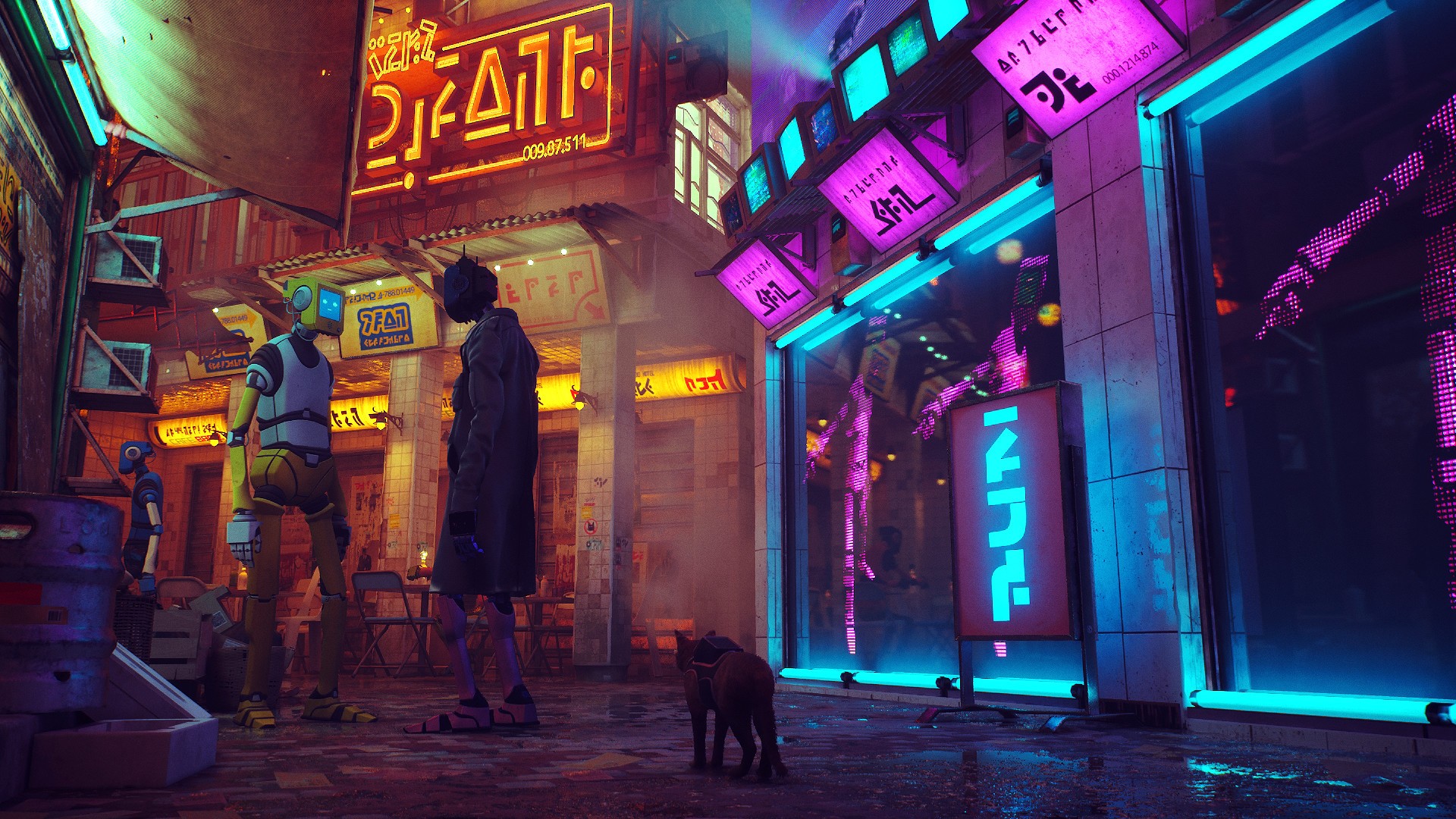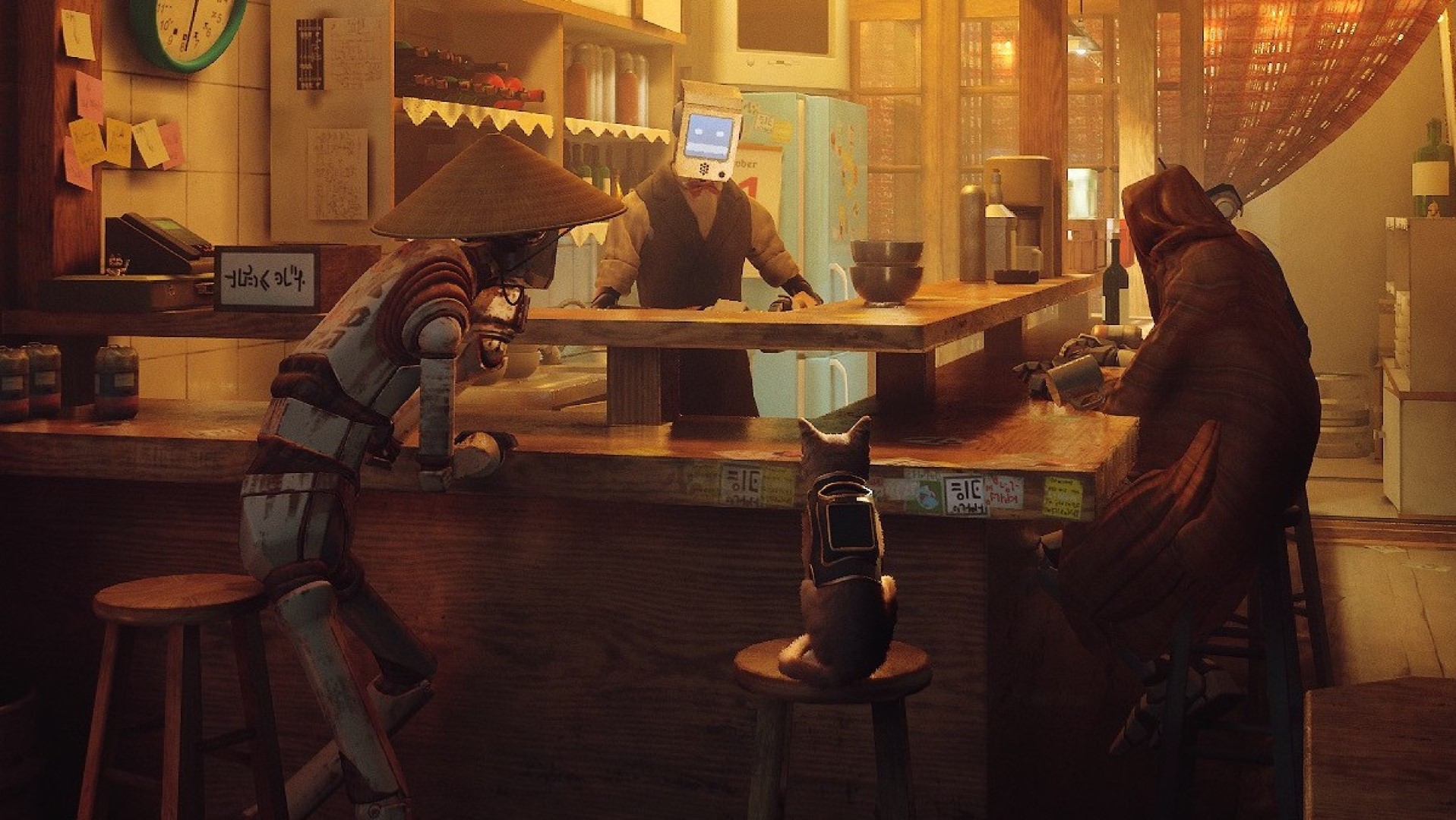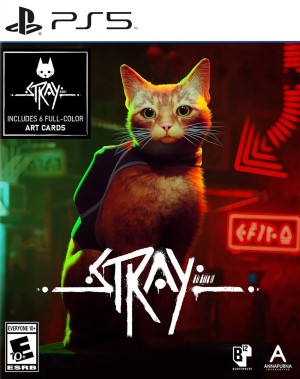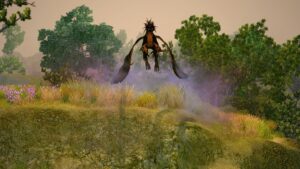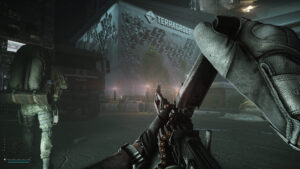
You play as a stray cat in a dystopian cyberpunk city populated only by robots. BlueTwelve Studio’s adventure game has a strong elevator pitch that has had many people excited since it was first revealed, but while that premise is certainly one of the game’s biggest strengths and something that instantly draws you in, what makes Stray a genuinely memorable experience for the entirety of its runtime is that it’s not a game without substance. Its unique premise might be what piques your curiosity enough to want to give the game a go, but it doesn’t take long to discover that there’s much more to it that gets you to stick with it. Stray’s world is rich and well-realized, its narrative interesting and well told, its gameplay simple yet engaging.
There’s plenty to be impressed with here, and not just on a surface level. That you play as a cat, for instance, isn’t just a quick and easy way to get you interested. The game goes out of its way to strive for authenticity as well, from the detailed and lifelike animations of the cat to the things that you can do as it, including knocking things off ledges and scratching up walls and furniture and carpets. Hell, the game even gives you a dedicated meow button, just so you can meow whenever you feel it’s appropriate. More often than not, it doesn’t make any real mechanical difference. But, hell, I’ll just say it, and I’m only being partly ironic here- it really makes you feel like a cat.
"Its unique premise might be what piques your curiosity enough to want to give the game a go, but it doesn’t take long to discover that there’s much more to it that gets you to stick with it. Stray’s world is rich and well-realized, its narrative interesting and well told, its gameplay simple yet engaging."
The world of Stray also reveals layers of depth as you progress further in the game. There’s an instantly eye-catching appeal to its cyberpunk setting, which is grimy and vibrant and grim and eccentric all at once, but every one of its disparate elements feels earned, and feels like it contributes to a greater whole. The neon lights, the gritty and dirty environments, the whacky robot residents who’re so full of personality, the general mystery and dystopian vibe of the world- all of it comes together to create something that feels wholly unique. It feels like a fleshed-out place with its own past, and finding hidden memories that provide further backstory and flavour text to flesh it out even further is often excellent motivation to go off the beaten path and explore for those optional tidbits.
And just as interesting as Stray’s larger questions about its world and its past are the smaller stories of its characters. There’s a surprising number of secondary characters you’ll meet in the game who won’t have an awful lot of screen time, but will endear themselves to you even in the short time they’re around. Their personal stories are short and sweet, but enough to make those characters feel distinct and very personable. The best character is B-12, your flying bot companion who floats by your side for the vast majority of the game. In addition to being the cat’s primary way of interacting with its bizarre surroundings, B-12 also slowly develops a friendship with the cat, which is heartening to see. B-12 also has a mysterious past of its own that is slowly uncovered throughout the game, which is another one of the story’s stronger elements.
Meanwhile, just as Stray backs up the shiny veneer of its world and story with actual depth and substance, so, too, does it deliver a gameplay experience that’s more engaging than some might expect. It’s not all just about doing the things that a cat would do with no real direction. As an adventure game, Stray doesn’t have an awful lot of combat, and is instead built around solving environmental puzzles, exploring environments, and avoiding enemies in stealth sequence or chase set-pieces. Simply moving around as the cat is predictably fun, and though jumps are scripted rather than requiring actual platforming, figuring out how to get from one spot to another in Stray’s dense and vertical environments is consistently enjoyable.
"Simply moving around as the cat is predictably fun, and though jumps are scripted rather than requiring actual platforming, figuring out how to get from one spot to another in Stray’s dense and vertical environments is consistently enjoyable."
Puzzles, meanwhile, are not exactly brain teasers, and very rarely do they need you to think about anything for more than a few seconds. While some of them can occasionally end up feeling like busywork though, Stray’s pacing remains quick enough and those puzzles remain varied enough for it not to be much of a problem. Just like puzzles, stealth sequences and other sections that bring you face-to-face with enemies are also simple yet effective. Given their straightforward nature, there isn’t too much to say about them, other than the fact that they’re always fun on at least a fundamental level.
Between its scripted moments, Stray also often takes a beat to let players explore small semi-open world hub areas. I won’t go into how many times that happens or how big those areas area, but exploring them is always fun for multiple reasons, whether that’s because of the enjoyable vertical navigation, or how visually impressive and detailed they are, or meeting interesting new NPCs, or taking on side activities. Side activities, in particular, can be surprisingly engaging, from hunting down memories, which I mentioned earlier, to, say, finding three different flowers for a robot who’s looking to brighten up her garden. These open-ended sections are always just the right length, and the areas themselves just the right size and exactly as dense as they need to be.
All said and done, Stray should take you about 6-8 hours to finish, and in that time, it gets the best out of its narrative and gameplay ideas. It moves from beat to beat at a brisk pace, spends the right amount of time on the things it should spend time on, and moves on before it can let anything outstay its welcome. Would I have wanted it to be a little longer? Absolutely- but that’s more because I just wanted more of the game than it not doing enough with its ideas. That can be a tricky balance to strike for most games in terms of length, but Stray hits that sweet spot. It helps that it also looks great, and not once throughout the experience will you feel like it’s making any sacrifices where production quality is concerned.
"Stray should take you about 6-8 hours to finish, and in that time, it gets the best out of its narrative and gameplay ideas. It moves from beat to beat at a brisk pace, spends the right amount of time on the things it should spend time on, and moves on before it can let anything outstay its welcome."
From a gameplay perspective, Stray isn’t going to win any awards. It’s straightforward, although it takes care to never let that mean unengaging either. But by constantly keeping the player’s attention, be it either via gameplay or its unique setting and atmosphere, Stray makes a very compelling case for itself, and for the player to stick with it beyond just the initial curiosity that the elevator pitch incites. “A cat in a cyberpunk city” is no low-effort ploy to generate conversation and interest- it’s the foundation of a genuinely good game with a lot of heart.
This was was reviewed on the PlayStation 5.
You play as a cat; The cat's movements are very, well, cat-like; Simple yet effective gameplay mechanics; Navigation and puzzles are largely fun; Engaging exploration and side activities; Genuinely captivating and well-told story; Endearing characters; Perfectly paced; Looks great.
Puzzles can feel like busywork at times.









